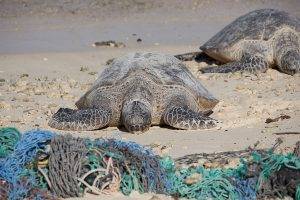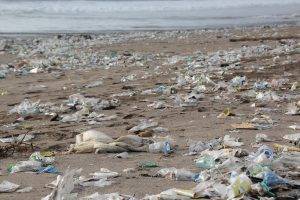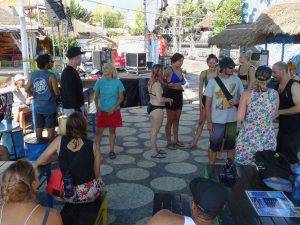This may seem like a pretty obvious question with an obvious answer. We organise beach cleanups to clear litter and prevent plastic from entering or re-entering the ocean. As a result we can enjoy our time at the beach, but is there more to cleaning our beaches than this?
1) Marine debris kills
It’s a simple and very evident fact. It causes entanglement and gets caught around the necks, beaks, wings, flukes, flippers and fins of marine mammals and birds. Even the smallest pieces of plastic can have fatal results. We’ve all seen images and footage of:
- Seabirds picking up small pieces of plastic. They feed their young chicks whose stomachs get filled with plastic leading to starvation and poisoning.
- Turtles eating plastic bags thinking they’re jellyfish.
- Whales ingesting plastic bags. As a result of the volume of water they process in order to grow and maintain their huge bodies, whales take in more plastic than any other marine creature.
Ingestion of marine plastic creates blockages in digestive systems. It causes pain, internal injuries, suppressed immune and reproductive systems and, ultimately, death for most marine life.

2) Keep our beach ecosystems healthy
In a very recent development, scientists are now thinking that our coastal regions are acting as filters for ocean plastic. As with filter-feeding marine creatures, such as baleen whales, the sea passes through their filtration system leaving behind the krill. A similar effect occurs on our beaches with the ebb and flow of the tides. Ocean-born plastic arrives at our beaches during the high tide and when the tide recedes the plastic is left behind.
Worldwide, there are 356,000 km of coastline and Indonesia has the second largest amount of coastline with 54,716 km. With 4 items of plastic debris per square metre of coastal water in Indonesia (compared to 10-100 per square kilometre in the English Channel), every tide sees a huge amount of ocean plastic being deposited on Indonesia’s beaches every single day. Add to that the land-based littering of visitors and locals and you can see the issue is out of control.
Our beaches and coastal regions around the globe are just one of the natural filtrations systems of our oceans. Plastic will continue getting dumped on these areas and without our intervention (e.g. through beach cleanups) our coastal regions will continue being plastic graveyards.

3) Raise awareness about plastic trash
Ocean scientists have estimated that 8-13 million tonnes of plastic trash enter our oceans every year. Every 11 years that figure doubles. What scientists haven’t yet managed to work out is where all this plastic currently is.
Through computer models and extrapolated calculations, scientists now believe that what we’re finding on the sea surface accounts for just 1% of all the plastic that has entered our oceans. This means that a staggering 99% is largely unaccounted for. Part of the missing 99% lies on the coast, part of it sits on the sea floor and another part is inside the stomachs of marine animals.
What scientists do agree on is that 80% of ocean plastic originates from land and ends up in the ocean when spat out through rivers, waterways and through illegal dumping.
Doing a beach cleanup is a great tool to raise awareness about plastic pollution to try and encourage people to use less.
Joining beach cleanups
All filtration systems need regular cleaning and maintenance; it’s no different for our waterways and beaches. Hundreds of thousands of dedicated beach cleaners worldwide, most of whom are volunteers, spend thousands of hours each week in over 100 countries at beach cleanups. Why? Because it can and does make a difference.
Take Versova beach in Mumbai, India. In just 2 years, Afroz Shah, a young lawyer and environmentalist, spearheaded the complete transformation of the 3km-long beach. In 21 months Versova went from a stinking dump that was over 1.5m deep in neighbourhood trash and ocean plastic into a pristine beach. Just one man persuaded over 1,000 volunteers to help him and 5,300 tonnes later at least 80 endangered Olive Ridley turtles were seen returning to the beach to lay their eggs.
Ocean Mimic, a Bali-based charity, is one of several groups helping to tackle the 188 tonnes of waste entering Bali’s coastal waters every day. The charity works to raise awareness through education programs and weekly beach cleanups. In addition, they also organise a network of cleanups worldwide. In just over 1 year, Ocean Mimic has instigated the collection of over 12 tonnes of inorganic waste from beaches worldwide with over 4,500 volunteers!

You can make a difference!
Both these examples show that individuals can make a difference. It’s vital that we reduce the amount of plastic entering our oceans, but the actual ACT of picking it up can be used as tool to raise awareness and to educate. This is why cleanups are so important. Ask any regular beach cleaners how often members of the public will stop them to ask questions and see how they can get involved.
Each cleanup raises awareness within the larger community. Beach cleanups enable volunteers to educate not only themselves, but those around them. The act of participating in cleanups helps us as individuals to feel empowered. To feel that we can do something that will make a difference and to alleviate that feeling of helplessness having been bombarded by images of how plastic is destroying our planet, killing our wildlife and the part we’ve played in that.
It all starts with you!


